Contracts and Property rights There are some essential

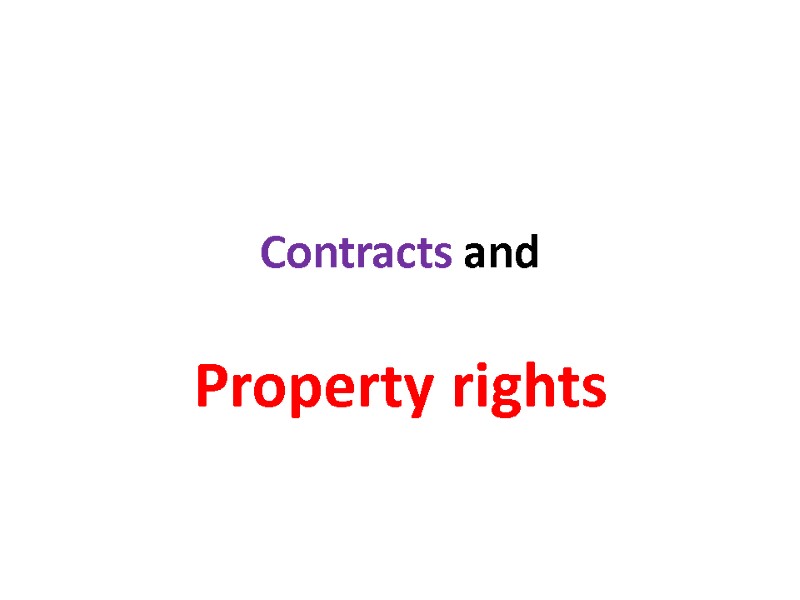
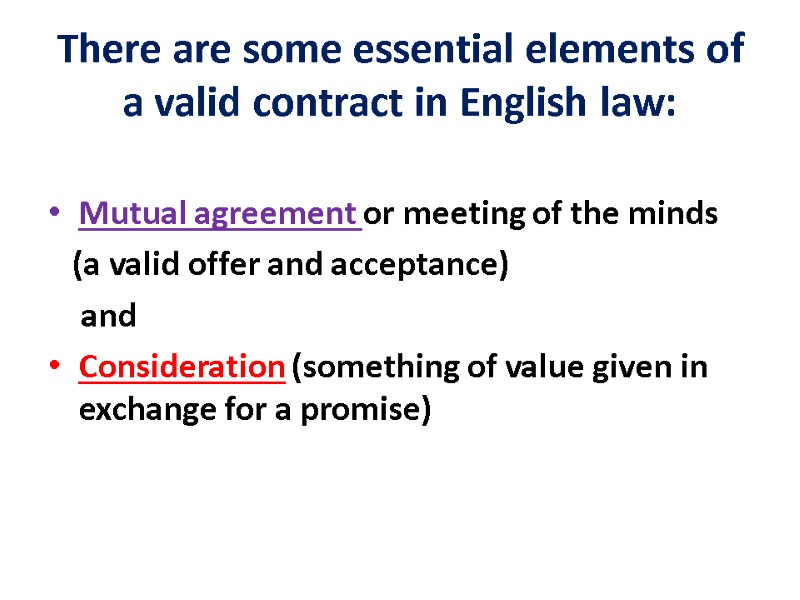
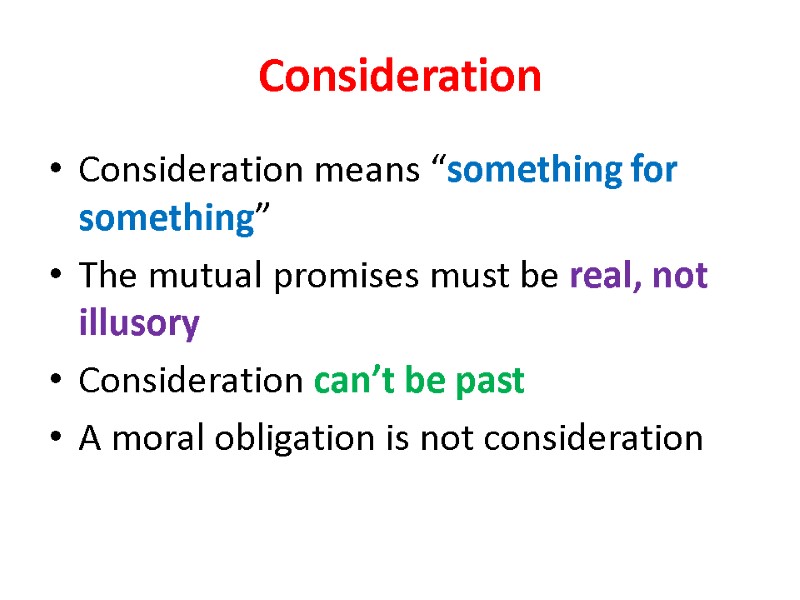

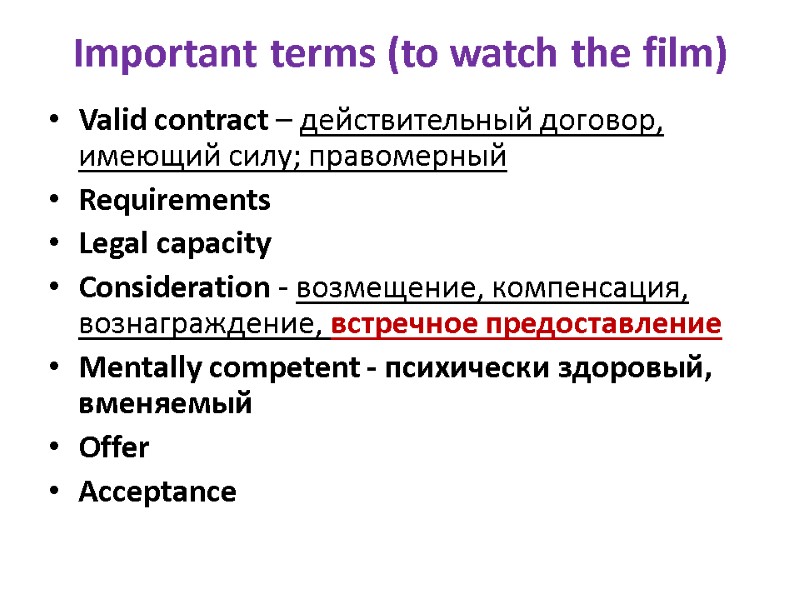
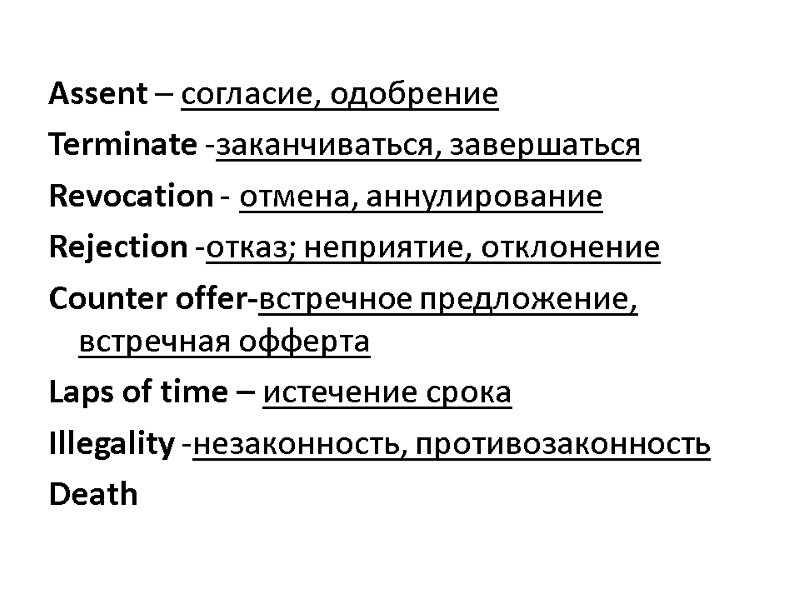
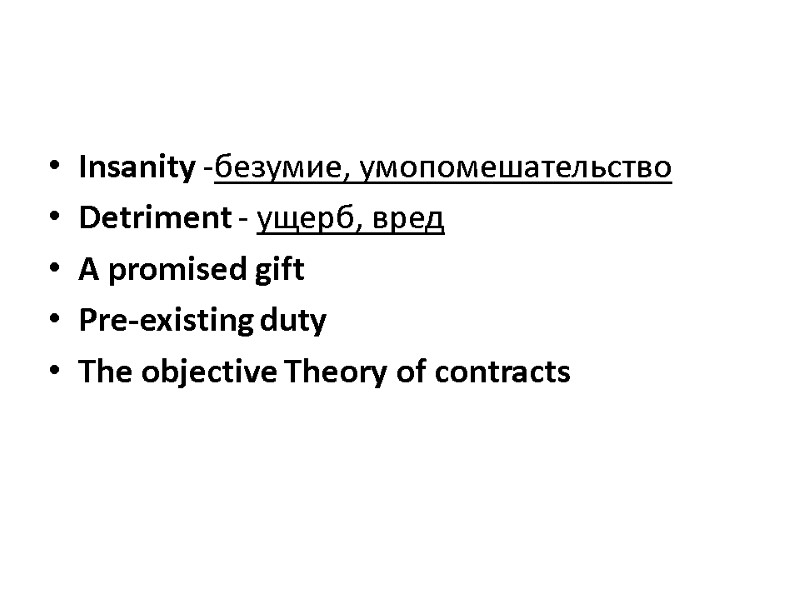
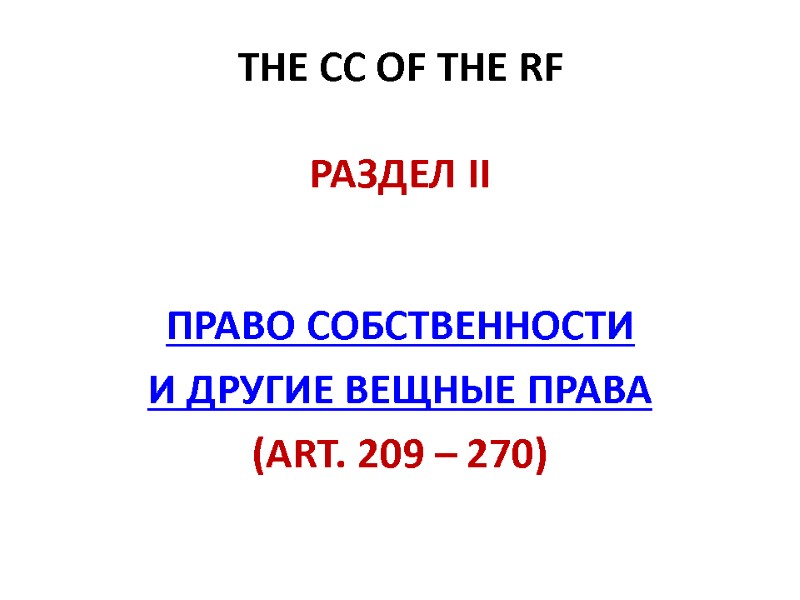
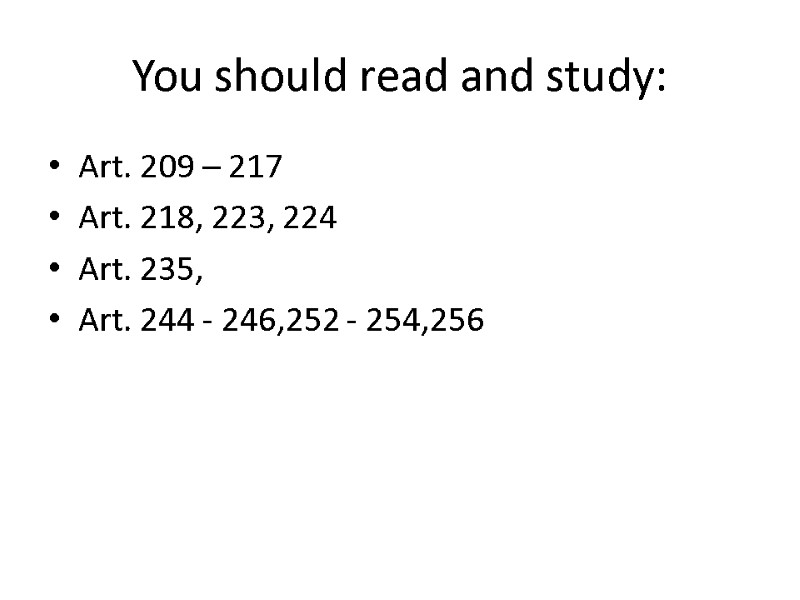
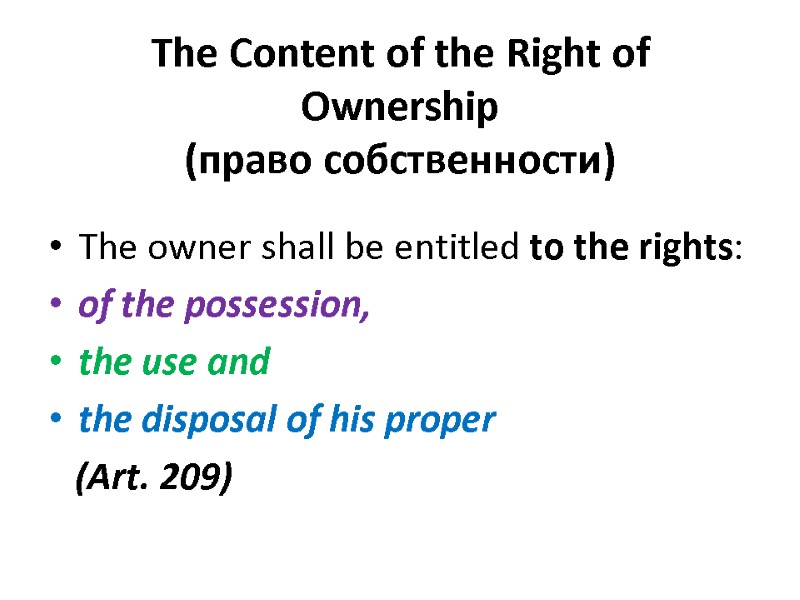
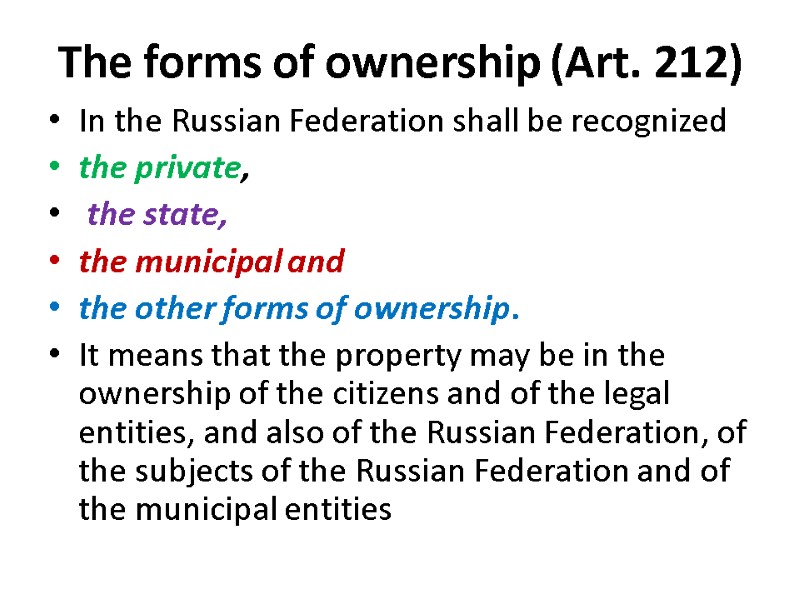
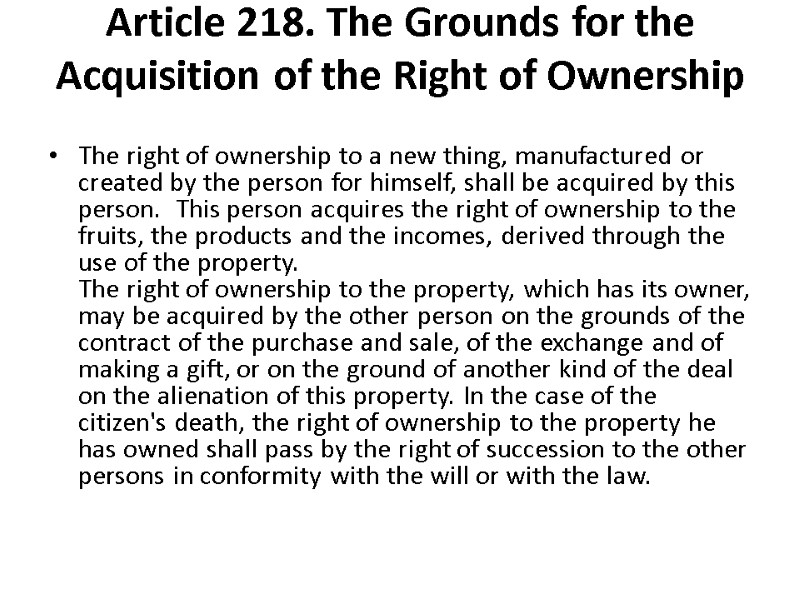
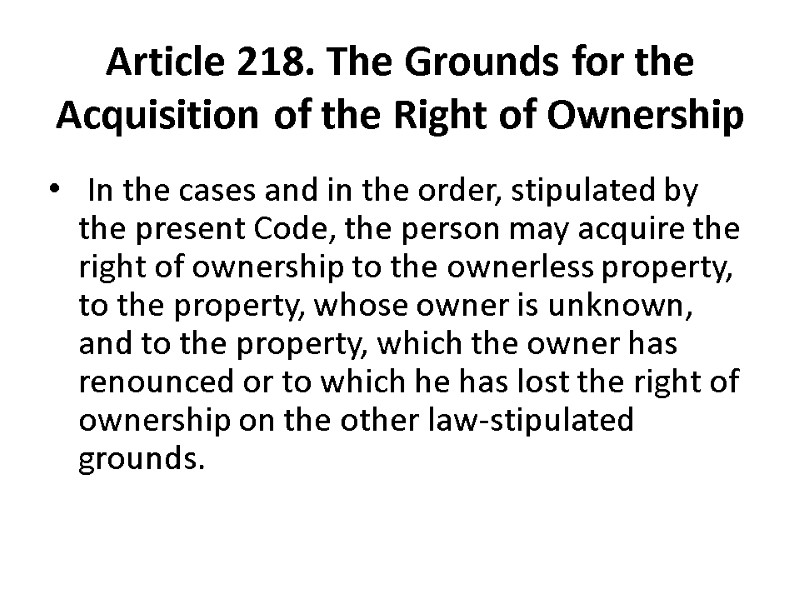
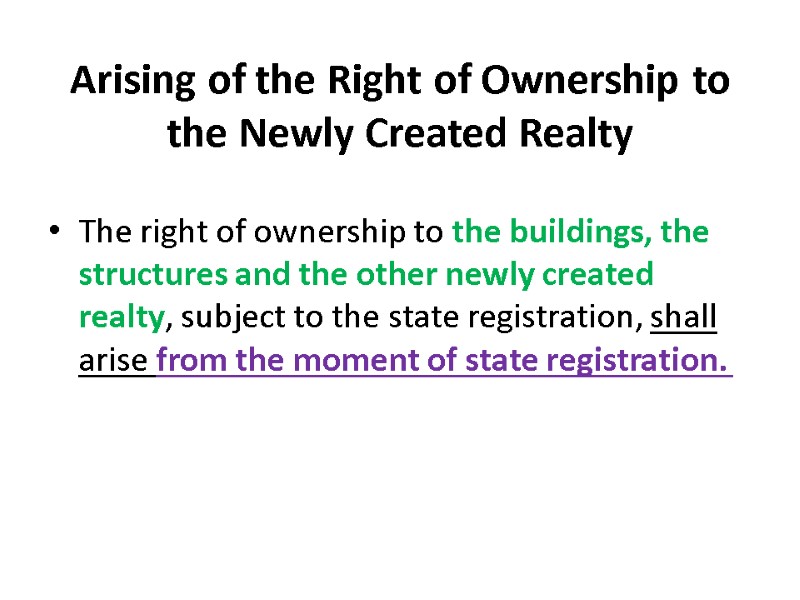
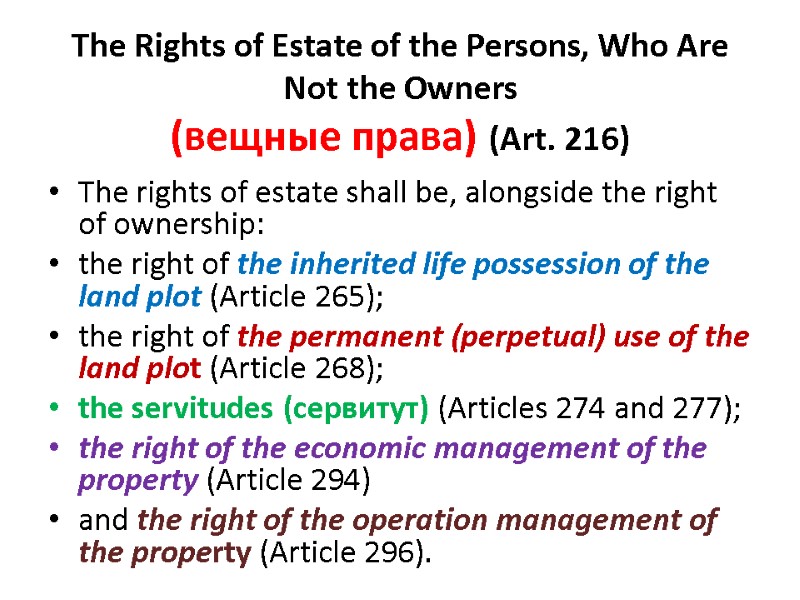
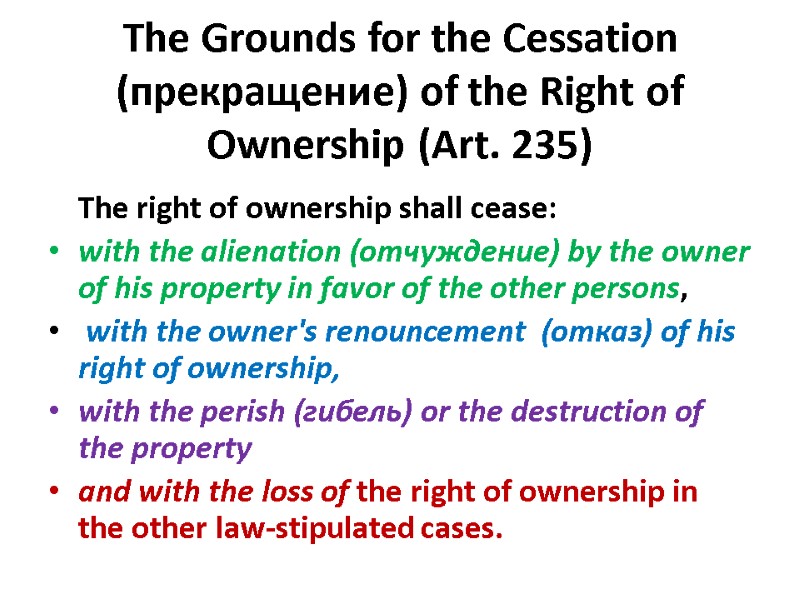
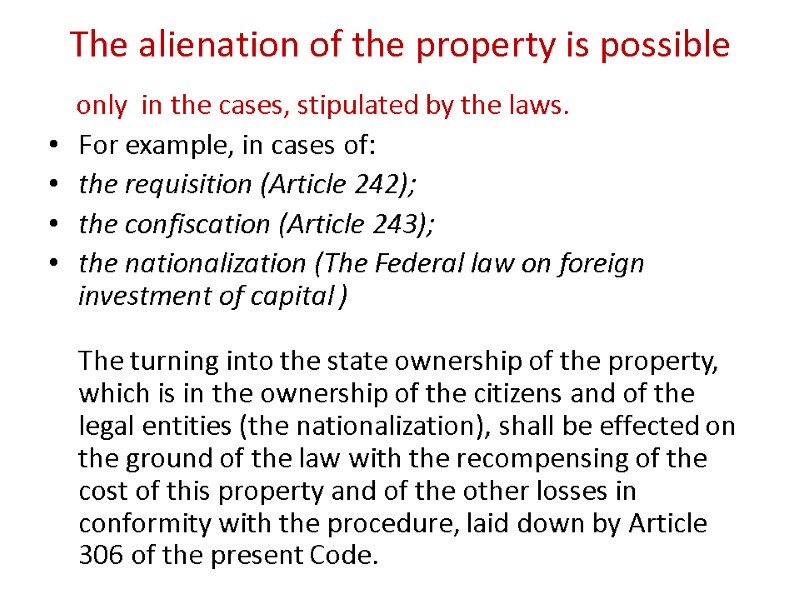
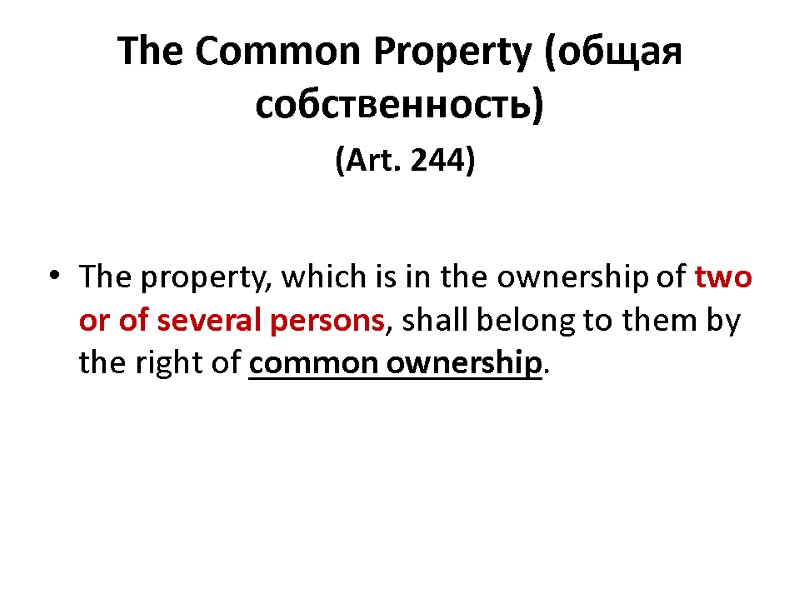
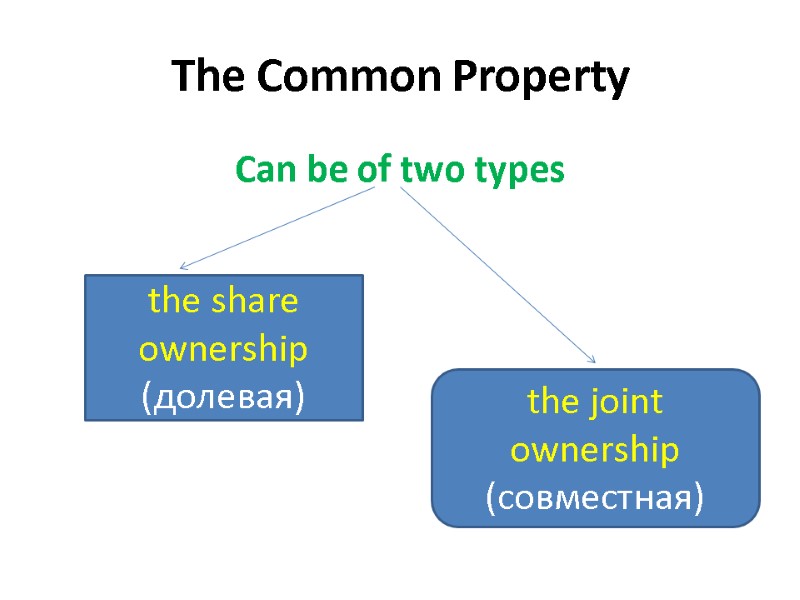
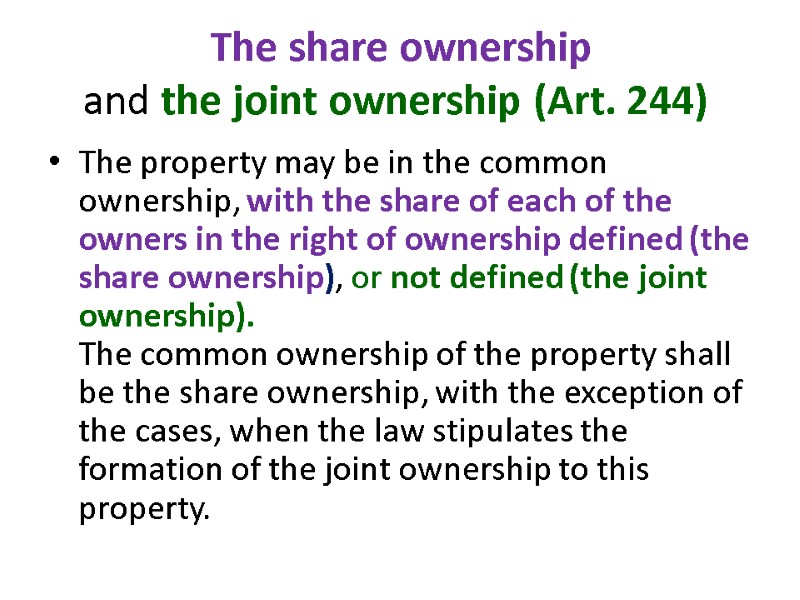
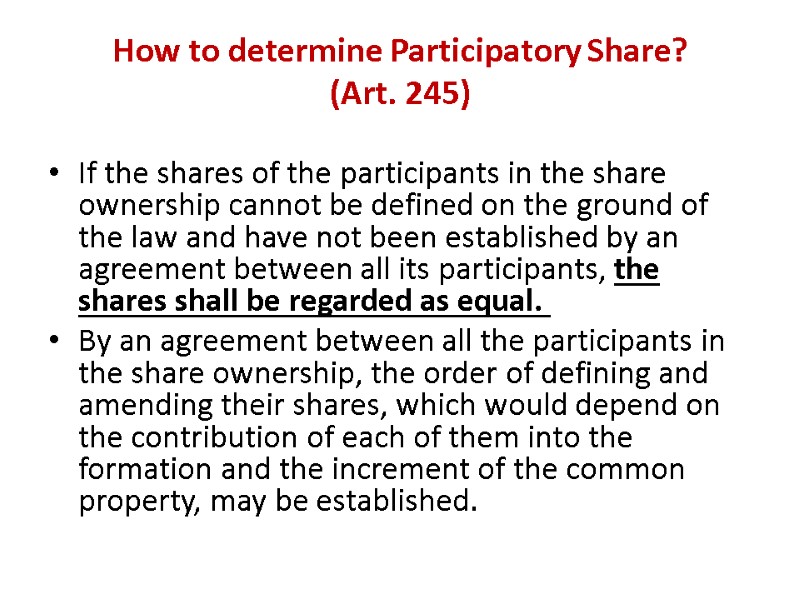
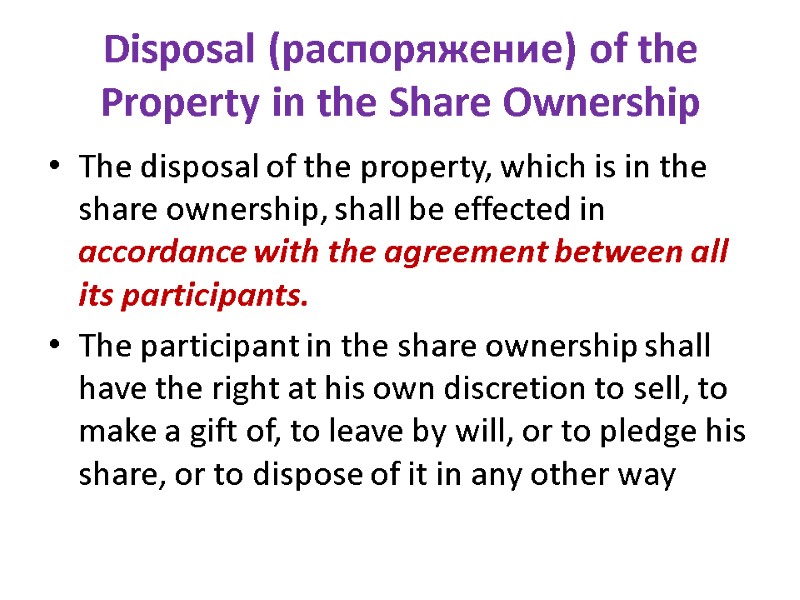
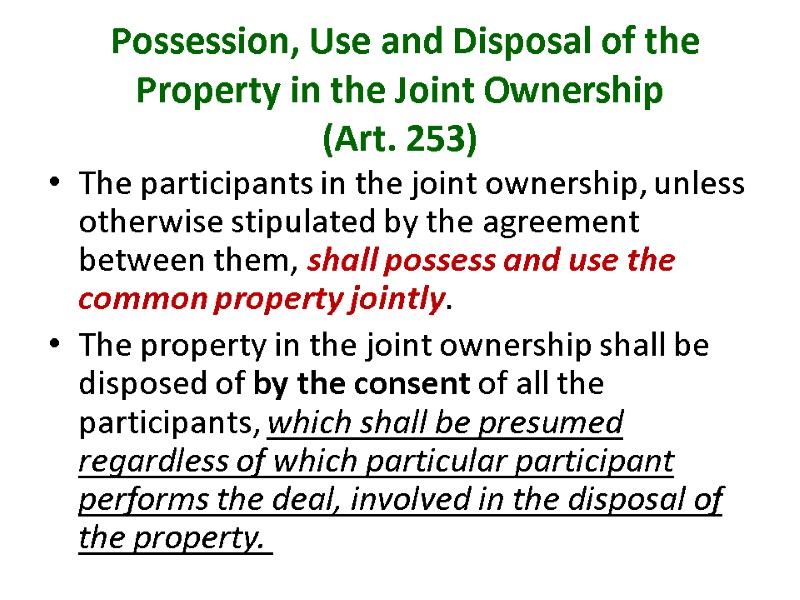
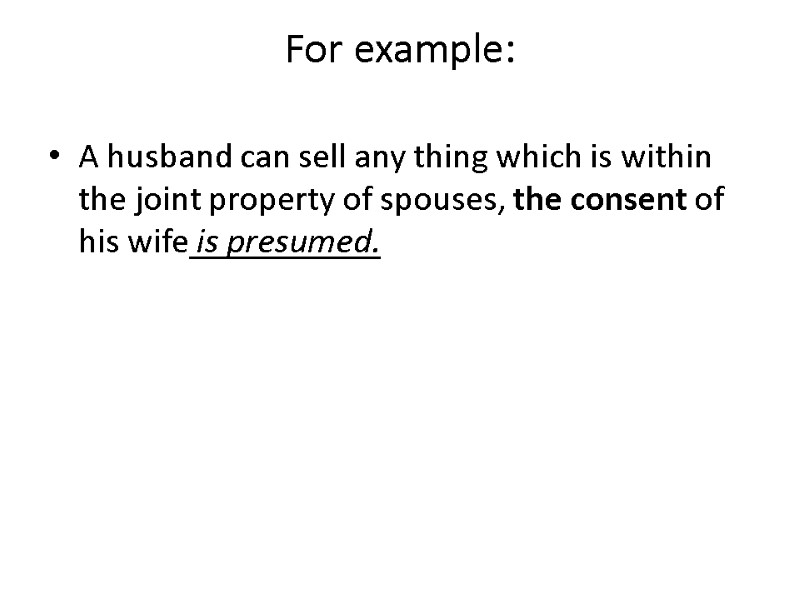
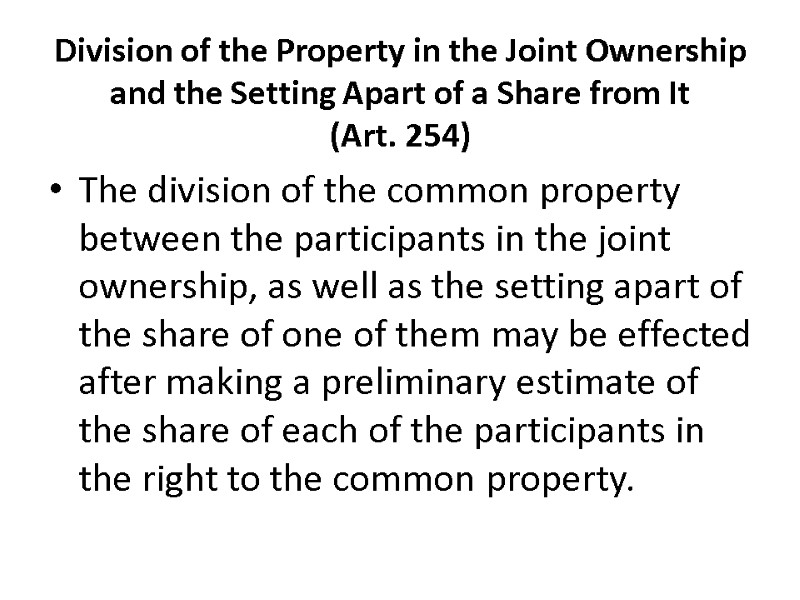
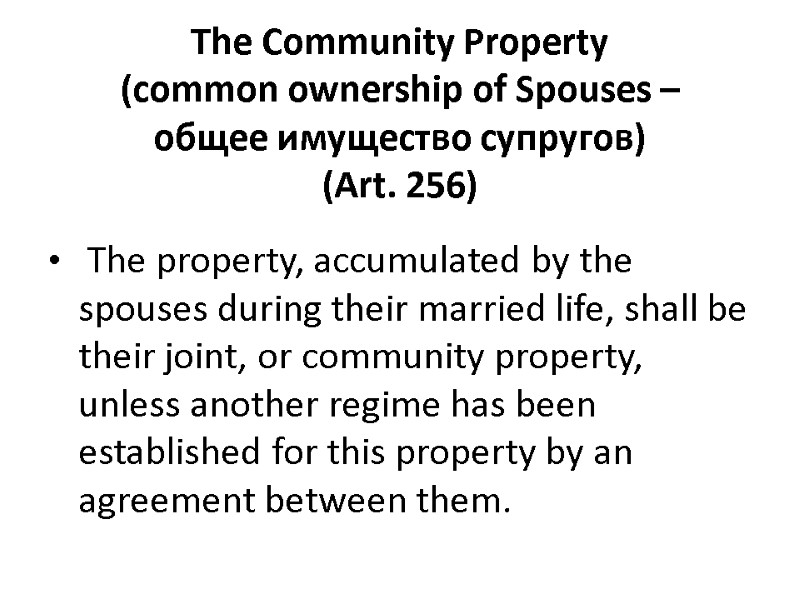
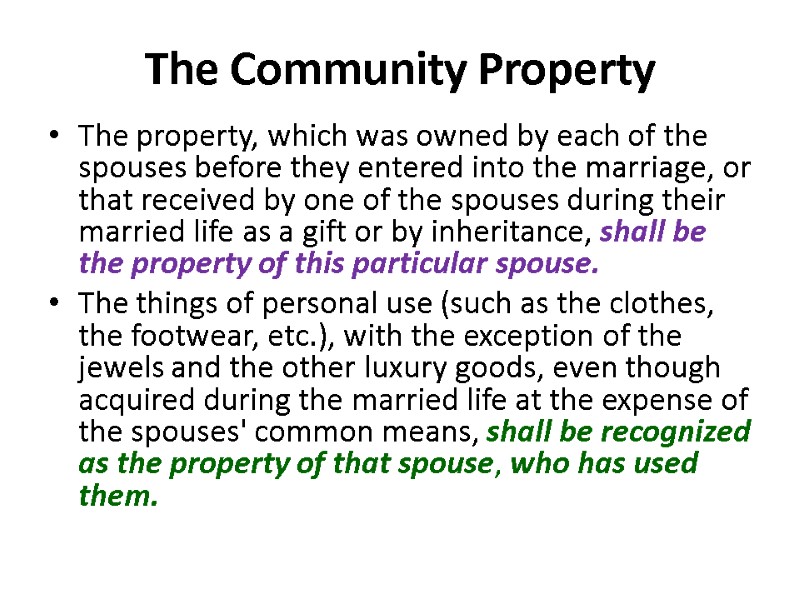
1240-property_rights_for_students.ppt
- Количество слайдов: 27
 Contracts and Property rights
Contracts and Property rights
 There are some essential elements of a valid contract in English law: Mutual agreement or meeting of the minds (a valid offer and acceptance) and Consideration (something of value given in exchange for a promise)
There are some essential elements of a valid contract in English law: Mutual agreement or meeting of the minds (a valid offer and acceptance) and Consideration (something of value given in exchange for a promise)
 Consideration Consideration means “something for something” The mutual promises must be real, not illusory Consideration can’t be past A moral obligation is not consideration
Consideration Consideration means “something for something” The mutual promises must be real, not illusory Consideration can’t be past A moral obligation is not consideration
 A question Can English people conclude a contract of Gift?
A question Can English people conclude a contract of Gift?
 Important terms (to watch the film) Valid contract – действительный договор, имеющий силу; правомерный Requirements Legal capacity Consideration - возмещение, компенсация, вознаграждение, встречное предоставление Mentally competent - психически здоровый, вменяемый Offer Acceptance
Important terms (to watch the film) Valid contract – действительный договор, имеющий силу; правомерный Requirements Legal capacity Consideration - возмещение, компенсация, вознаграждение, встречное предоставление Mentally competent - психически здоровый, вменяемый Offer Acceptance
 Assent – согласие, одобрение Terminate -заканчиваться, завершаться Revocation - отмена, аннулирование Rejection -отказ; неприятие, отклонение Counter offer-встречное предложение, встречная офферта Laps of time – истечение срока Illegality -незаконность, противозаконность Death
Assent – согласие, одобрение Terminate -заканчиваться, завершаться Revocation - отмена, аннулирование Rejection -отказ; неприятие, отклонение Counter offer-встречное предложение, встречная офферта Laps of time – истечение срока Illegality -незаконность, противозаконность Death
 Insanity -безумие, умопомешательство Detriment - ущерб, вред A promised gift Pre-existing duty The objective Theory of contracts
Insanity -безумие, умопомешательство Detriment - ущерб, вред A promised gift Pre-existing duty The objective Theory of contracts
 The CC of the RF РАЗДЕЛ II ПРАВО СОБСТВЕННОСТИ И ДРУГИЕ ВЕЩНЫЕ ПРАВА (Art. 209 – 270)
The CC of the RF РАЗДЕЛ II ПРАВО СОБСТВЕННОСТИ И ДРУГИЕ ВЕЩНЫЕ ПРАВА (Art. 209 – 270)
 You should read and study: Art. 209 – 217 Art. 218, 223, 224 Art. 235, Art. 244 - 246,252 - 254,256
You should read and study: Art. 209 – 217 Art. 218, 223, 224 Art. 235, Art. 244 - 246,252 - 254,256
 The Content of the Right of Ownership (право собственности) The owner shall be entitled to the rights: of the possession, the use and the disposal of his proper (Art. 209)
The Content of the Right of Ownership (право собственности) The owner shall be entitled to the rights: of the possession, the use and the disposal of his proper (Art. 209)
 The forms of ownership (Art. 212) In the Russian Federation shall be recognized the private, the state, the municipal and the other forms of ownership. It means that the property may be in the ownership of the citizens and of the legal entities, and also of the Russian Federation, of the subjects of the Russian Federation and of the municipal entities
The forms of ownership (Art. 212) In the Russian Federation shall be recognized the private, the state, the municipal and the other forms of ownership. It means that the property may be in the ownership of the citizens and of the legal entities, and also of the Russian Federation, of the subjects of the Russian Federation and of the municipal entities
 Article 218. The Grounds for the Acquisition of the Right of Ownership The right of ownership to a new thing, manufactured or created by the person for himself, shall be acquired by this person. This person acquires the right of ownership to the fruits, the products and the incomes, derived through the use of the property. The right of ownership to the property, which has its owner, may be acquired by the other person on the grounds of the contract of the purchase and sale, of the exchange and of making a gift, or on the ground of another kind of the deal on the alienation of this property. In the case of the citizen's death, the right of ownership to the property he has owned shall pass by the right of succession to the other persons in conformity with the will or with the law.
Article 218. The Grounds for the Acquisition of the Right of Ownership The right of ownership to a new thing, manufactured or created by the person for himself, shall be acquired by this person. This person acquires the right of ownership to the fruits, the products and the incomes, derived through the use of the property. The right of ownership to the property, which has its owner, may be acquired by the other person on the grounds of the contract of the purchase and sale, of the exchange and of making a gift, or on the ground of another kind of the deal on the alienation of this property. In the case of the citizen's death, the right of ownership to the property he has owned shall pass by the right of succession to the other persons in conformity with the will or with the law.
 Article 218. The Grounds for the Acquisition of the Right of Ownership In the cases and in the order, stipulated by the present Code, the person may acquire the right of ownership to the ownerless property, to the property, whose owner is unknown, and to the property, which the owner has renounced or to which he has lost the right of ownership on the other law-stipulated grounds.
Article 218. The Grounds for the Acquisition of the Right of Ownership In the cases and in the order, stipulated by the present Code, the person may acquire the right of ownership to the ownerless property, to the property, whose owner is unknown, and to the property, which the owner has renounced or to which he has lost the right of ownership on the other law-stipulated grounds.
 Arising of the Right of Ownership to the Newly Created Realty The right of ownership to the buildings, the structures and the other newly created realty, subject to the state registration, shall arise from the moment of state registration.
Arising of the Right of Ownership to the Newly Created Realty The right of ownership to the buildings, the structures and the other newly created realty, subject to the state registration, shall arise from the moment of state registration.
 The Rights of Estate of the Persons, Who Are Not the Owners (вещные права) (Art. 216) The rights of estate shall be, alongside the right of ownership: the right of the inherited life possession of the land plot (Article 265); the right of the permanent (perpetual) use of the land plot (Article 268); the servitudes (сервитут) (Articles 274 and 277); the right of the economic management of the property (Article 294) and the right of the operation management of the property (Article 296).
The Rights of Estate of the Persons, Who Are Not the Owners (вещные права) (Art. 216) The rights of estate shall be, alongside the right of ownership: the right of the inherited life possession of the land plot (Article 265); the right of the permanent (perpetual) use of the land plot (Article 268); the servitudes (сервитут) (Articles 274 and 277); the right of the economic management of the property (Article 294) and the right of the operation management of the property (Article 296).
 The Grounds for the Cessation (прекращение) of the Right of Ownership (Art. 235) The right of ownership shall cease: with the alienation (отчуждение) by the owner of his property in favor of the other persons, with the owner's renouncement (отказ) of his right of ownership, with the perish (гибель) or the destruction of the property and with the loss of the right of ownership in the other law-stipulated cases.
The Grounds for the Cessation (прекращение) of the Right of Ownership (Art. 235) The right of ownership shall cease: with the alienation (отчуждение) by the owner of his property in favor of the other persons, with the owner's renouncement (отказ) of his right of ownership, with the perish (гибель) or the destruction of the property and with the loss of the right of ownership in the other law-stipulated cases.
 The alienation of the property is possible only in the cases, stipulated by the laws. For example, in cases of: the requisition (Article 242); the confiscation (Article 243); the nationalization (The Federal law on foreign investment of capital ) The turning into the state ownership of the property, which is in the ownership of the citizens and of the legal entities (the nationalization), shall be effected on the ground of the law with the recompensing of the cost of this property and of the other losses in conformity with the procedure, laid down by Article 306 of the present Code.
The alienation of the property is possible only in the cases, stipulated by the laws. For example, in cases of: the requisition (Article 242); the confiscation (Article 243); the nationalization (The Federal law on foreign investment of capital ) The turning into the state ownership of the property, which is in the ownership of the citizens and of the legal entities (the nationalization), shall be effected on the ground of the law with the recompensing of the cost of this property and of the other losses in conformity with the procedure, laid down by Article 306 of the present Code.
 The Common Property (общая собственность) (Art. 244) The property, which is in the ownership of two or of several persons, shall belong to them by the right of common ownership.
The Common Property (общая собственность) (Art. 244) The property, which is in the ownership of two or of several persons, shall belong to them by the right of common ownership.
 The Common Property Can be of two types the share ownership (долевая) the joint ownership (совместная)
The Common Property Can be of two types the share ownership (долевая) the joint ownership (совместная)
 The share ownership and the joint ownership (Art. 244) The property may be in the common ownership, with the share of each of the owners in the right of ownership defined (the share ownership), or not defined (the joint ownership). The common ownership of the property shall be the share ownership, with the exception of the cases, when the law stipulates the formation of the joint ownership to this property.
The share ownership and the joint ownership (Art. 244) The property may be in the common ownership, with the share of each of the owners in the right of ownership defined (the share ownership), or not defined (the joint ownership). The common ownership of the property shall be the share ownership, with the exception of the cases, when the law stipulates the formation of the joint ownership to this property.
 How to determine Participatory Share? (Art. 245) If the shares of the participants in the share ownership cannot be defined on the ground of the law and have not been established by an agreement between all its participants, the shares shall be regarded as equal. By an agreement between all the participants in the share ownership, the order of defining and amending their shares, which would depend on the contribution of each of them into the formation and the increment of the common property, may be established.
How to determine Participatory Share? (Art. 245) If the shares of the participants in the share ownership cannot be defined on the ground of the law and have not been established by an agreement between all its participants, the shares shall be regarded as equal. By an agreement between all the participants in the share ownership, the order of defining and amending their shares, which would depend on the contribution of each of them into the formation and the increment of the common property, may be established.
 Disposal (распоряжение) of the Property in the Share Ownership The disposal of the property, which is in the share ownership, shall be effected in accordance with the agreement between all its participants. The participant in the share ownership shall have the right at his own discretion to sell, to make a gift of, to leave by will, or to pledge his share, or to dispose of it in any other way
Disposal (распоряжение) of the Property in the Share Ownership The disposal of the property, which is in the share ownership, shall be effected in accordance with the agreement between all its participants. The participant in the share ownership shall have the right at his own discretion to sell, to make a gift of, to leave by will, or to pledge his share, or to dispose of it in any other way
 Possession, Use and Disposal of the Property in the Joint Ownership (Art. 253) The participants in the joint ownership, unless otherwise stipulated by the agreement between them, shall possess and use the common property jointly. The property in the joint ownership shall be disposed of by the consent of all the participants, which shall be presumed regardless of which particular participant performs the deal, involved in the disposal of the property.
Possession, Use and Disposal of the Property in the Joint Ownership (Art. 253) The participants in the joint ownership, unless otherwise stipulated by the agreement between them, shall possess and use the common property jointly. The property in the joint ownership shall be disposed of by the consent of all the participants, which shall be presumed regardless of which particular participant performs the deal, involved in the disposal of the property.
 For example: A husband can sell any thing which is within the joint property of spouses, the consent of his wife is presumed.
For example: A husband can sell any thing which is within the joint property of spouses, the consent of his wife is presumed.
 Division of the Property in the Joint Ownership and the Setting Apart of a Share from It (Art. 254) The division of the common property between the participants in the joint ownership, as well as the setting apart of the share of one of them may be effected after making a preliminary estimate of the share of each of the participants in the right to the common property.
Division of the Property in the Joint Ownership and the Setting Apart of a Share from It (Art. 254) The division of the common property between the participants in the joint ownership, as well as the setting apart of the share of one of them may be effected after making a preliminary estimate of the share of each of the participants in the right to the common property.
 The Community Property (common ownership of Spouses – общее имущество супругов) (Art. 256) The property, accumulated by the spouses during their married life, shall be their joint, or community property, unless another regime has been established for this property by an agreement between them.
The Community Property (common ownership of Spouses – общее имущество супругов) (Art. 256) The property, accumulated by the spouses during their married life, shall be their joint, or community property, unless another regime has been established for this property by an agreement between them.
 The Community Property The property, which was owned by each of the spouses before they entered into the marriage, or that received by one of the spouses during their married life as a gift or by inheritance, shall be the property of this particular spouse. The things of personal use (such as the clothes, the footwear, etc.), with the exception of the jewels and the other luxury goods, even though acquired during the married life at the expense of the spouses' common means, shall be recognized as the property of that spouse, who has used them.
The Community Property The property, which was owned by each of the spouses before they entered into the marriage, or that received by one of the spouses during their married life as a gift or by inheritance, shall be the property of this particular spouse. The things of personal use (such as the clothes, the footwear, etc.), with the exception of the jewels and the other luxury goods, even though acquired during the married life at the expense of the spouses' common means, shall be recognized as the property of that spouse, who has used them.

